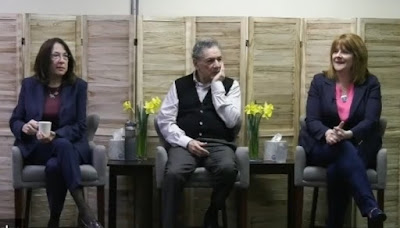I
have been thinking about the word “comfortable” recently. I know
it doesn’t sound very
exciting, but I think living in an exciting community might be too
exhausting. Instead,
I’m going to suggest
that we build two sorts of “comfortable” into our project:
environmental comfort and social comfort.
My
guru of environmental
comfort is
the architect Professor Christopher Alexander. To give you some
hints about him, here’s
a quote from The Battle for the Life and Beauty of the Earth:
“The purpose of all architecture … is to provide opportunities for life-giving situations. The central … purpose is to … provide encouragement and support for life-giving comfort and profound satisfaction … so that one experiences life as worth living.”If you would like to experience how it feels to be in a building built with this philosophy in mind, visit West Dean Gardens, just outside Chichester, and sit in the visitor centre. When I first went there my initial thought was “this doesn’t feel very architectural”.
But that’s the
point. It fits perfectly into its surroundings, and when I sit
inside I feel perfectly comfortable (except for my bum: Alexander had
no part in designing the cushions for the wooden chairs!) Certainly
when I’m at West
Dean Gardens I experience life as worth living. Alexander’s
ideas help us to design all our spaces, from rooms, to buildings to
the overall site, to
provide
encouragement and support for life-giving comfort.
But
today I want to talk more about social
comfort.
I’m
a bit of a complicated character with a life
story that’s too long
to go into. Don’t encourage me, I’m likely to go on forever!
Recently
I have felt uncomfortable in NFCH: not the fault of anyone, just my
own “stuff”. As a result I felt the need to withdraw to reduce
my level of
discomfort.
Several
interesting things happened. The first was that I became aware of
other people experiencing discomfort (not for the same reasons as
me). I also experienced various people offering comfort and support
(with varying degrees of success).
And,
coincidentally
Susan and I were attending (via Zoom link) a retreat that was taking
place 5000 miles away in the very top-left
corner of the USA, just inside the Canadian border. It was a strange
experience: we were sitting
on our sofa in Eastleigh, with the laptop on the coffee table, and
there were these lovely people speaking
words of wisdom.
Odd, but very
comforting.
It
reminded me of the days when I used to teach Co-counselling. Co-co
was (is) a form of self-help emotional support where you attend a
course to learn the skills and the culture and then subsequently you
join a co-counselling community (not a physical community, like NFCH,
but a local, national or
world-wide community of
co-counsellors) and can always find someone to work with, and/or be
with, without it feeling like a culture shock. Once trained as a
co-counsellor you
can always find social comfort in group of other co-counsellors.
I
recently realised
that I can divide co-counselling into two pieces: the psychological
part
and the social part.
These days I have many disagreements with the psychological part,
but the social part
I now see is highly
relevant to our current endeavour.
Back
in the day the
Winchester co-counselling community used to suspend meetings in the
summer (everyone was away on holiday) and I can still remember that
first meeting in September, being back in the group, with a
heart-felt “ahhh”. Like
sinking into a warm bath. The
culture that we had built for our group—our community—was
profoundly comfortable.
I
want more of that, and so I would like to offer NFCH
a one-day course on
culture setting. I propose to call it “Are
we comfortable yet?”
It will be highly experiential—no Power-points, no handouts, no
manuals, no “propositional knowledge”. Hopefully, it will be fun
(you can never predict these things). There will be lots of
exercises and some games. Sometimes you may not be able to tell
which is which. We will ask participants to wear loose, comfortable
clothing, and to bring food to share at lunchtime. There will be no
guidance or rules about what food you bring. If quinoa salad is your
thing, fine, and if you want to bring a bucket of KFC, also fine.
I
propose that the workshop is free to all attendees, and
there is also a
“tip bucket”. People will be asked to contribute as much as they
can afford to
cover the cost of the venue, drinks, and expenses.
My
ideal number of attendees is 12, simply because it’s the best
number if you have small-group work (you can have groups
of 2, 3, 4, 6). It is
usually my luck that if I aim for 12 I get 11 or 13: the prime
numbers either side! The biggest group I ever ran was 72, which took
a big room, some nimble planning-on-the-fly on my part, and a
resolution not to do that again! I
have run these groups for the universities of Surrey, Southampton,
and Bath, various GP surgeries, and many private groups.
We
could run this on either a Saturday or a Sunday (or both if the
demand is high enough).




No comments:
Post a Comment